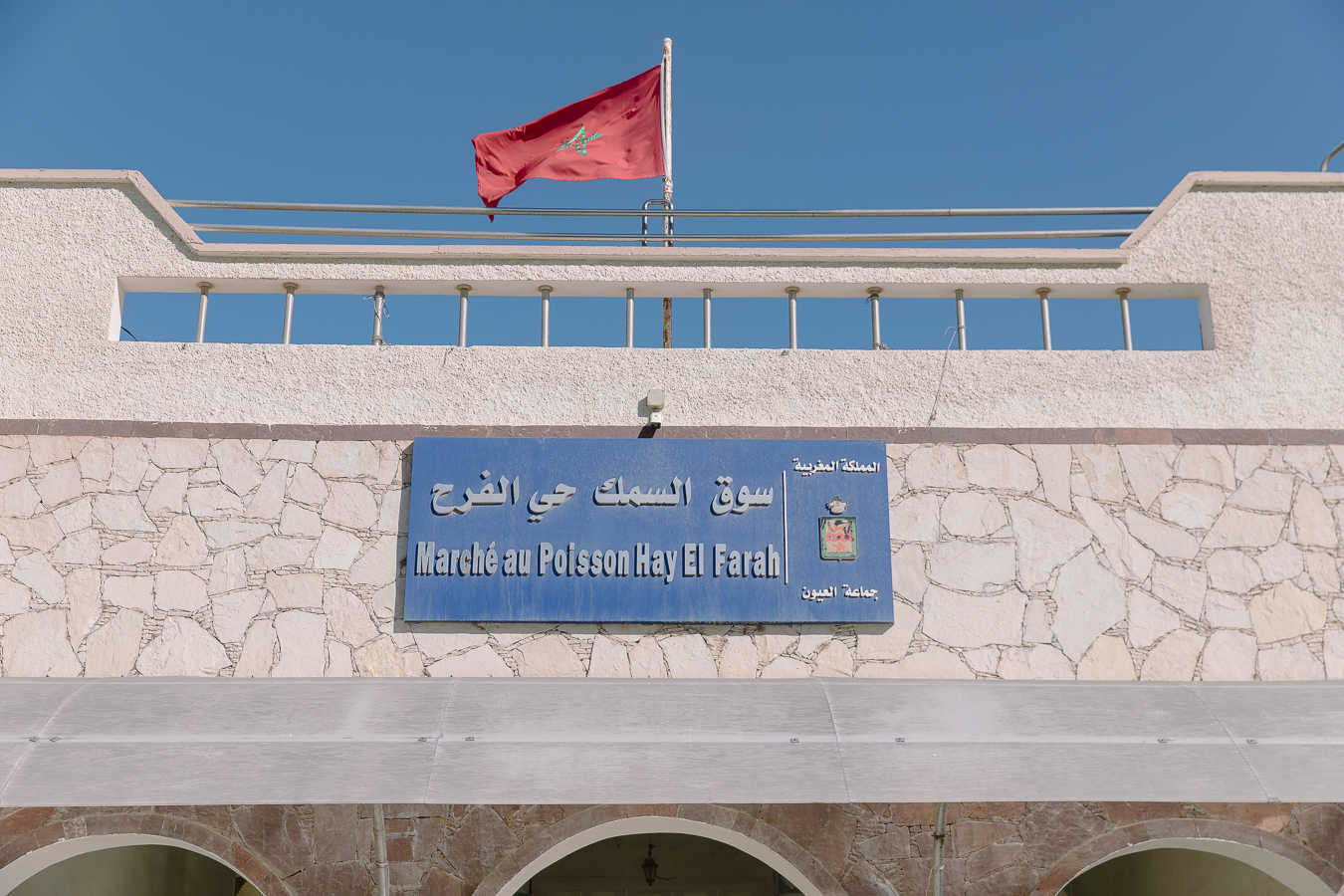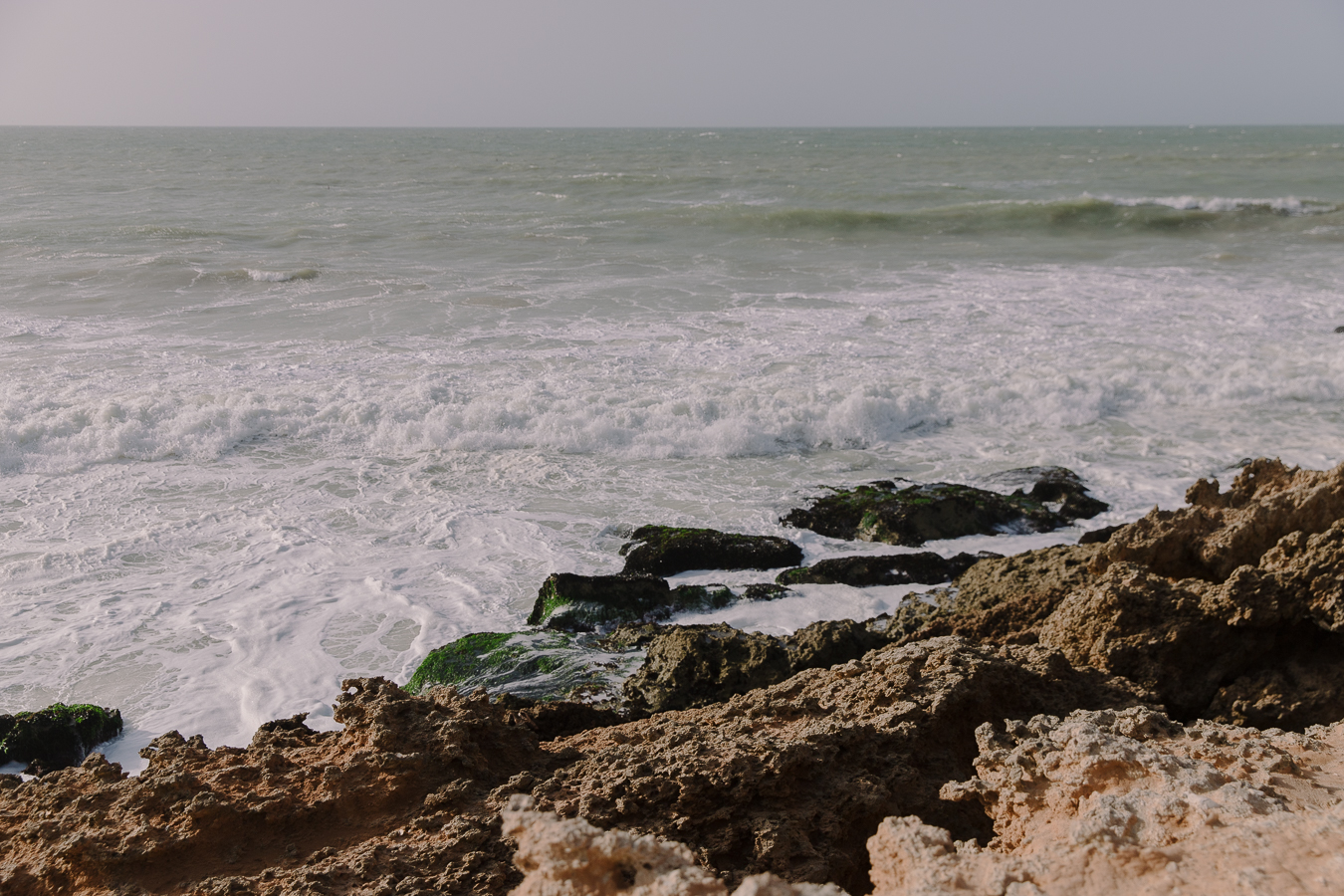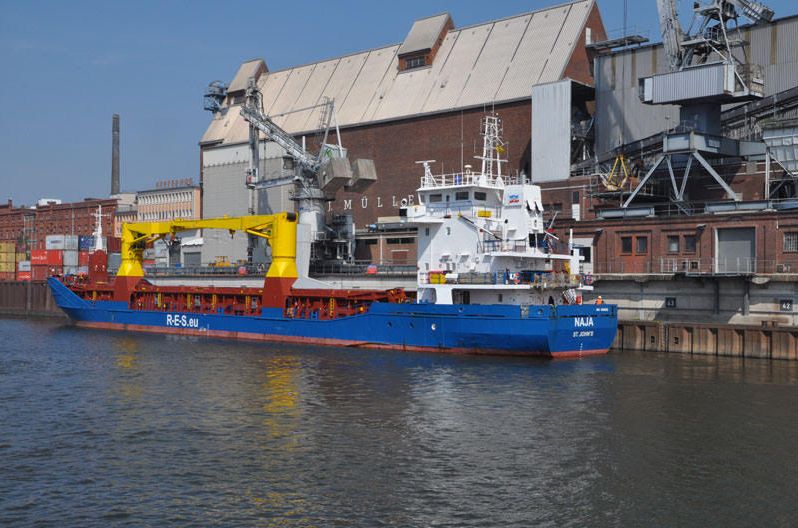
The certification system greenwashes multimillion-euro fisheries products from occupied Western Sahara - under false country of origin.
Photo: Köster Marine Proteins in Bremen, Germany, is a key entry point for fishmeal from Western Sahara into Europe. The company will not explain how it obtained a “responsible supply” certificate. MarinTrust, the certifier and the exporters in the occupied territory have likewise failed to answer questions.
European importers of fish products – particularly companies using high-value fish meal and fish oil for aquaculture and fish feed – claim their products originate from certified sustainable or responsible fisheries. Over the past year, Western Sahara Resource Watch (WSRW) has challenged the companies involved in the certification sector to clarify how the settler-operated fisheries in occupied Western Sahara can receive such certifications.
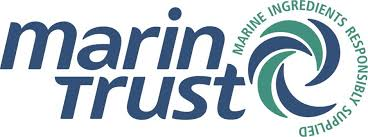
A significant portion of the fish meal and fish oil sector in Western Sahara carries the blue-green certification logo of the London-based company Marine Ingredients Certifications Ltd (MarinTrust), purportedly guaranteeing responsible fisheries practices.
However, serious inconsistencies emerge in how the MarinTrust standard is applied in occupied Western Sahara. A closer review suggests that certificates issued under MarinTrust’s name lack both credibility and transparency. All certificate documents furthermore contain grave errors.
MarinTrust appears to accept companies being misattributed to the wrong country and makes incorrect references to which Economic Exclusive Zone where catches are made. The practice contradicts rulings by the Court of Justice of the European Union, and appears inconsistent even with principles outlined in MarinTrust’s own standards. It remains unclear how MarinTrust defines legal compliance regarding both the fisheries themselves and the production process. All this happens repeatedly, even after having been made aware of the grave errors by WRSW.
WSRW first contacted MarinTrust on 29 November 2024, receiving confirmation of receipt on 2 December 2024. Yet, no response has been provided, despite follow-ups on MarinTrust on 25 December 2024 and 6 September 2025.
The lack of answers mirrors the complete silence of the Moroccan producing companies in Western Sahara, importers in Europe and the third-party bodies issuing the certificates. Not one has explained how certificates containing false country information could comply with MarinTrust standards.
“MarinTrust’s so-called ‘responsibility’ is nothing but a glossy sticker on what appears to be a completely shallow structure. MarinTrust sells the illusion of responsibility while certifying exploitation in occupied waters. Behind the branding, there’s nothing but negligence, from the exporters, the third-party certification bodies and from MarinTrust itself. It is completely incomprehensible that a scheme based on responsibility can get away with this sort of practice,” said Erik Hagen of WSRW.
“If MarinTrust truly respected the Law of the Sea, it wouldn’t certify Moroccan fisheries in Western Sahara. They should travel to the refugee camps and tell the Saharawis directly that the Standard’s paragraph on the Law of the Sea stops where their own business begins”, Hagen said.
It is unclear how much MarinTrust profits from accepting such certificates. The company charges fees both per company certified and per facility. Fee structures are published on their website.
WSRW specifically inquired about certificates issued to Tiscop Trading (2023), Copelit S.A.R.L (2022), KB Fish (2022), Laayoune Protein (2024), Protein and Oil Industry (2022), Atlantic Tank Terminal (2022), DIPROMER (2020), and fish meal importer Köster Marine Proteins (2022) under the two standards: a) MarinTrust Standard for Responsible Supply of Marine Ingredients Version 2.0. and b) Marine Ingredients Responsibly Supplied Chain of Custody Standard (Issue 1.1 and 2)).
Since WSRW sent its first letter, further three Moroccan companies have been certified: Oued Eddahab Pro (2025), Pelagic Pro II (2025), Overseas Proteine (2025), whereas the certificate to Atlantic Tank Terminal was renewed (2025).
In its letter to MarinTrust, WSRW emphasized that it cannot understand how it concluded that companies in the occupied territory could obtain certificates, given the criteria outlined in its standards.
All the Moroccan certified establishments are listed on the certificates as being in «Laayoune, Morocco» or «Dakhla, Morocco». However, neither city is part of Morocco. Here is a UN map of Africa. WSRW called this geographical error and failure to comply with international rulings “gross negligence”.
MarinTrust’s standards specifically states - that it “draws upon” the United Nations Convention on the Law of the Sea (UNCLOS). However, in the context of Western Sahara, this reference seems largely symbolic. UNCLOS grants sovereign rights over fisheries and Exclusive Economic Zones to the recognised coastal state. As ruled by the European Court of Justice in 2018 (C-266/16, paras 66-69) Morocco is, however, not the “coastal state” of Western Sahara within the meaning of UNCLOS, meaning it does not have the recognised sovereign rights over Western Sahara’s waters.
By certifying fisheries in Western Sahara as “Moroccan”, MarinTrust effectively disregards the requirement under UNCLOS that the legitimate coastal authority must consent to resource exploitation. The United Nations consider Western Sahara to be a non-self-governing territory without an administering power in place. The people of Western Sahara have not given its consent neither to the Moroccan fisheries nor to MarinTrust’s certification practices.
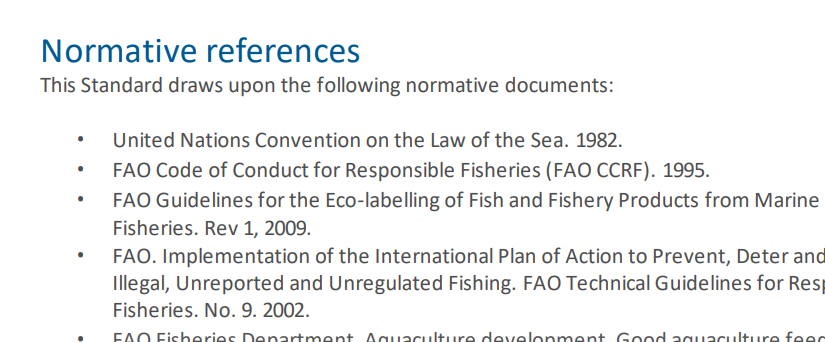
One certificate to the company Protein and Oil Industry (2022) even suggests that the catches landed at a factory in Dakhla originate from the Moroccan EEZ. This claim is most likely inaccurate: WSRW is not aware of any instances, ever, where fish caught within Morocco’s EEZ, which extends no further south than the 27°40′N parallel, has been landed at the port of Dakhla, located roughly 450 kilometers further south.
Recent years have witnessed an emerging body of law pertaining to Morocco’s claim to the territory. MarinTrust seems not to have picked up this development at all. Since 2015, in ten (!) consecutive rulings, the Court of Justice of the European Union has concluded on the following points as settled:
- The territory of Western Sahara constitutes a territory distinct from that of Morocco.
- Morocco has no sovereignty or administering mandate over Western Sahara.
- Consequently, the waters adjacent to Western Sahara cannot be regarded as part of the Moroccan fishing zone, territorial waters, exclusive economic zone.
- The people of Western Sahara are to be regarded as a third party to the EU’s agreements with Morocco, and that as such, no agreement can affect their territory without their consent, as a corollary of the right to self-determination.
- The Court is clear that the right to consent resides with the people of Western Sahara, and not with the population of the territory. The Court stipulates that “a majority of the population of Western Sahara is not part of the people holding the right to self-determination, namely the people of Western Sahara. That people, which for the most part has been displaced, is the sole holder of the right to self-determination with regard to the territory of Western Sahara.” The Court adds that “there is a difference in that regard between the concept of the ‘population’ of a non-self-governing territory and of the ‘people’ of that territory. The latter refers to a political unit which holds the right to self-determination, whereas the concept of ‘population’ refers to the inhabitants of a territory.”
- The Court has established the position of Front Polisario, the UN-recognised representation of the people of Western Sahara to be able to bring cases before EU Courts on behalf of the Saharawi people, and that it has access to the Court to defend their right to self-determination.
- In Case C‑399/22, which specifically dealt with the labelling of products from Western Sahara, the Court again emphasised the separate and distinct status of the territory in relation to Morocco, and concluded that at the stages of import and sale to the consumer, the labelling of the goods from Western Sahara must indicate Western Sahara alone as the country of origin of those goods.
The precise legal reference to each of these elements are found in WSRW’s letter to MarinTrust.
A ruling by the African Court on Human and People’s Rights and the International Court of Justice reinforce these points.
Yet, MarinTrust appears to treat Western Sahara and its waters as part of Morocco.
WSRW contacted the third-party bodies that issued the certificates with the erroneous country information, namely Global Trust, Intertek/SAI or SGS, but none responded to WSRW’s inquiries.
WSRW reached out to Tiscop Trading, Copelit, KB Fish, Laayoune Protein, Protein and Oil Industry, Atlantic Tank Terminal, DIPROMER, Köster Marine Proteins in relation to their MarinTrust certifications. The only company to acknowledge contact was Atlantic Tank Terminal’s parent company in France, Olvea. However, Olvea did not answer any questions relating to the MarinTrust certificate.
It appears that MarinTrust is not certifying Russian fisheries in Ukrainian waters as responsible, nor Israeli fisheries in Palestinian. It is not clear to WSRW why MarinTrust treats these matters differently.
Meanwhile, the protracted conflict continues to exact a heavy human and humanitarian toll. More than 170,000 Saharawis remain in refugee camps in neighbouring Algeria, enduring harsh desert conditions and dwindling humanitarian aid. Those who live under Morocco’s occupation face serious and ongoing human rights violations. In 2023, the UN High Commissioner for Human Rights lamented that his Office had been barred from visiting Western Sahara for the past eight years.
Below are some of the unanswered questions WSRW has sent to MarinTrust regarding its standards and certifications:
Regarding MarinTrust and international law:
- Does MarinTrust agree with the ICJ, CJEU, UN and the African Court on Peoples’ and Human Rights that Western Sahara is not part of Morocco?
- Does MarinTrust agree with the CJEU that the waters offshore Western Sahara do not belong to Morocco’s EEZ?
- One certificate of a company in Western Sahara explains that the waters from where it is sourcing its raw material constitutes the “Moroccan EEZ”. The MarinTrust certificate relating to Cibel II in Agadir, refers to European Pilchard originating from similar “A”, “B” and “C” zones within the “Moroccan EEZ”. As known, Zone A is offshore Morocco proper, Zone B is offshore both Morocco and Western Sahara, stretching south to the 27° N latitude, whereas Zone C is only offshore Western Sahara. We see no other logical explanations to these references than it is in MarinTrust’s opinion that the Moroccan EEZ extends into Western Sahara. On what legal basis has MarinTrust come to such a conclusion?
- The MarinTrust Standard Version 3 mentions in its introduction that it “draws upon the following normative documents: • United Nations Convention on the Law of the Sea. 1982”. If Morocco is neither the sovereignty power nor the administering power over the non-self-governing territory of Western Sahara, and in light of the 2018 CJEU ruling on fisheries in the territory (paragraph 67-69), how can Morocco’s issuing of fishing licences for the waters off Western Sahara be seen as in line with the MarinTrust Standard, namely that the Standard draws upon the UNCLOS?
- MarinTrust has, during the years 2019-2024 finalised a series of reports assessing sustainability of the stocks in “Morocco” – such as here, here, here, here, here, here. These reports make no distinction between the waters of Morocco and Western Sahara, and state that the “Country of origin of the product” is Morocco. Around half of the establishments mentioned in the document are in Western Sahara. Why is the data from Western Sahara presented as being of Morocco?
Regarding the certification/standard:
- Taking into account that all MarinTrust allows certificates claiming that sites in Western Sahara are located in “Morocco”, has Global Trust, Intertek/SAI or SGS ever informed MarinTrust that the physical address of establishment is incorrect, through placing the cities of El Aaiún and Dakhla within the country of “Morocco”?
- In the Global Standard for Responsible Supply of Marine Ingredients version 3.0, under the point “Eligibility criteria” it is established that: “To be eligible to apply for certification, facilities shall: [...] • be legally licenced in the country of operation • meet the legal obligations that are in place for the jurisdiction(s) where marine ingredients are produced and supplied"
- Does MarinTrust agree that the country of operation of the establishments in El Aaiún and Dakhla is in fact not Morocco?
- If that is the case, how can it be seen as in line with the Standard that the place where marine ingredients are produced and supplied is located outside of the internationally recognised borders of the country that issued the licence to operate?
- In terms of social accountability, the Responsible Supply of Marine Ingredients version 2 requires applicants to “have a documented policy that demonstrates compliance with their national legislation to ensure that their marine ingredient products are manufactured in compliance to all relevant employment, welfare and safety requirements as stated in this sector”. Which national legislation does MarinTrust consider to be applicable in Western Sahara?
- In terms of reporting and recording of material, the Standard requires that recording of raw material includes proof of authorisation to engage in the specific fishing activity. Does MarinTrust accept authorisations accorded by the government of Morocco to be legally valid in occupied Western Sahara?
- The Standard for Responsible Supply of Marine Ingredients, version 2, contains provisions on “responsible sourcing of legal, regulated and reported fishery material and avoidance of material sourced from IUU fishing activity”. The Standard defines illegal fishing as “operating in a country’s waters without permission”. All fishing in the waters offshore Western Sahara takes place on the basis of licences accorded by the Moroccan government, which has no sovereignty, jurisdiction of administering mandate over Western Sahara or its waters. The provisions on responsible traceability further emphasize the importance that MarinTrust attaches to legally sourced material, in containing requirements that compliant marine ingredients are to be traced back to an approved fishery material, and that avoidance of IUU fishing should be demonstrated.
- If not IUU, how does MarinTrust qualify the legal nature of the Moroccan fisheries operations in Western Sahara?
- On what legal basis, according to MarinTrust, does the supplier of raw materials in Western Sahara sell fish caught in Western Sahara to the certified establishments?
- The MarinTrust certificate of the facilities of Nouvelle Ougala in Tan Tan, South Morocco, establish that the raw materials are supposed to originate from the «Moroccan EEZ».
- What is done, if anything, to ascertain that the raw materials that are transported to the factory Nouvelle Ougala, either by sea or by land, originate from the Moroccan EEZ, and not from south of parallel 27°40'N?
- Have measures been taken vis-a-vis the certified companies in South Morocco to ascertain that they agree with the interpretation of the CJEU and of the United Nations that the Moroccan EEZ does not extend into the waters offshore Western Sahara?
- The provisions on responsible manufacturing practices require packaging and labelling to display the country of production. Does MarinTrust accept that the certified companies in Western Sahara, include Morocco as the country of production on packaging and labelling?
- The Global Standard for Responsible Supply of Marine Ingredients Version 3.0, paragraph 2.11.2.1, establishes that facilities that are sourcing whole fish, need to ascertain that the "facility shall complete and document the results of the MarinTrust Social Responsibility Risk Assessment for all vessels". From what we understand, this is done based on data from the "Social risk assessment guidance for facilities", and, particularly, the Country Risk Ratings of Annex 2.
- As long as the territory of Western Sahara - which according to the CJEU, ICJ, African Court of Human and Peoples Rights - is not enlisted with a Country Risk rating, how is this measured?
- If applying the risk data for Morocco on Western Sahara, why is that done that way?
- The Standard contains requirements on community engagement. It expects the applicant to have a written evaluation of the potential impacts of direct operations on the local community.
- How does MarinTrust evaluate a written application by an applicant in occupied Western Sahara, that concludes a positive impact on “the local community” (which are in Western Sahara are in majority Moroccan settlers) against the wider impacts of certifying a business operation that runs on the back of illegal fishery in a territory under occupation, against the will of the people of the territory?
- Would MarinTrust consider the impact of a business on the local community to be of higher importance than the impact on the rights of the people of the territory in which the business operates?
- In terms of community engagement, “regular engagement with local community representatives and organizations” is expected. What relevance does this have in Western Sahara, where the denial of the right to freedom of assembly for Saharawis is well documented (there are no registered Saharawi organisations, as this is considered treason), and where the local community representatives are likely to be Moroccan, and not Saharawi (as Saharawis are a minority in their own land, and openly identifying yourself as Saharawi puts you under police surveillance)?
Regarding credibility of the scheme:
- Does MarinTrust consider it relevant to correctly reflect the country in which the certified establishments are located on its website?
- Does MarinTrust consider it relevant that its certificates correctly reflect the country in which the certified establishments are located?
- Does MarinTrust qualify incorrect country-of-origin as a matter of Food Fraud?
- Consumers have the right to know the origin of the products that they purchase. The companies operating in Western Sahara are not honestly reporting the country of origin of their products. What reputational risks does MarinTrust consider it might have for the Standard that its logo is to be found on products displaying a false country of origin, in violation of the CJEU ruling of 4 October 2024?
After sending the above questions to MarinTrust, WSRW has also noticed that the Moroccan company Pescasud SARLAU is sourcing fish from “Zone C” in Western Sahara to its site in Agadir.
Since you're here....
WSRW’s work is being read and used more than ever. We work totally independently and to a large extent voluntarily. Our work takes time, dedication and diligence. But we do it because we believe it matters – and we hope you do too. We look for more monthly donors to support our work. If you'd like to contribute to our work – 3€, 5€, 8€ monthly… what you can spare – the future of WSRW would be much more secure. You can set up a monthly donation to WSRW quickly here.
New report: Certified occupation
International certification standards embellish Morocco’s controversial trade with fisheries and agricultural products in occupied Western Sahara, new report documents.
Certification giant SGS points fingers elsewhere
SGS blames everyone else for mistakes on MarinTrust certificates it had issued to Moroccan companies in occupied Western Sahara.
GMP+ does not check if “sustainable” fish is legally caught
The world’s largest certification scheme for “safe and sustainable animal feed” does not check whether its certified fish feed companies source from illegal fisheries in occupied Western Sahara, where catches violate the Saharawi people’s right to self-determination.
ASC withdraws from occupied Western Sahara
Certification scheme ends involvement with Azura Group and declares that no future certifications will be granted to companies in the occupied territory.


